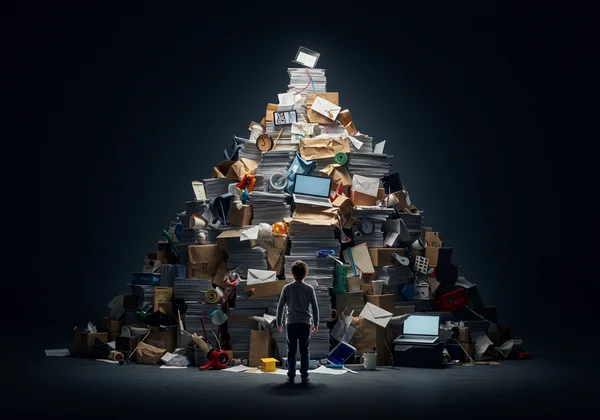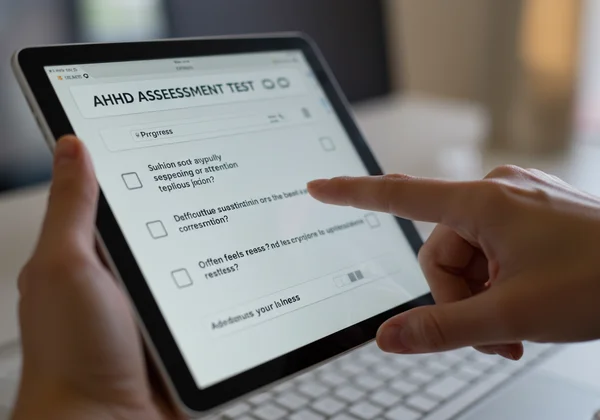एएसआरएस टेस्ट: वयस्क एडीएचडी का अन्वेषण करें
September 29, 2025 | By Miles Harrison
क्या आप अक्सर कार्यों से अभिभूत महसूस करते हैं, संगठन में संघर्ष करते हैं, या अपनी पूरी कोशिश के बावजूद टालमटोल करने की प्रवृत्ति पाते हैं? कई वयस्क इन अनुभवों को केवल इच्छाशक्ति की कमी से कहीं ज़्यादा मानते हैं। वे अक्सर "कार्यकारी कार्य में बाधा" नामक किसी स्थिति से जुड़ी होती हैं, जो एडीएचडी वाले लोगों के लिए एक सामान्य चुनौती है। क्या आपने कभी सोचा है कि साधारण कार्य इतने कठिन क्यों लगते हैं? यह मार्गदर्शिका कार्यकारी कार्य और एडीएचडी के बीच के संबंध को सरल बनाएगी, बताएगी कि यह दैनिक जीवन को कैसे प्रभावित करता है, और आपको यह समझने में मदद करेगी कि आपका मस्तिष्क अलग तरीके से क्यों काम कर रहा होगा। अपने लक्षणों का पता लगाने के लिए कुछ समय निकालना स्पष्टता की दिशा में एक सशक्त पहला कदम हो सकता है।

एडीएचडी में कार्यकारी कार्य में बाधा क्या है?
कार्यकारी कार्यों को अपने मस्तिष्क का प्रबंधन तंत्र के रूप में सोचें। वे मानसिक कौशल का एक समूह हैं जो एक हवाई यातायात नियंत्रण प्रणाली की तरह कार्य करते हैं, जो आपको समय का प्रबंधन करने, ध्यान देने और कार्यों को पूरा करने में मदद करते हैं। जब यह प्रणाली सुचारू रूप से काम नहीं करती है, तो इसे कार्यकारी कार्य में बाधा कहा जाता है। एडीएचडी वाले वयस्कों के लिए, यह निजी कमी नहीं है; यह मस्तिष्क के तंत्रिका-जैविक जुड़ाव में एक अंतर है। आत्म-दोष से आगे बढ़ने और प्रभावी रणनीतियों की ओर बढ़ने के लिए इस अवधारणा को समझना महत्वपूर्ण है।
मुख्य कार्यकारी कार्यों को तोड़ना
पूरी बात को समझने के लिए, इस प्रबंधन टीम में अलग-अलग भूमिकाओं को देखना मददगार होता है। ये मुख्य कार्य एक साथ काम करते हैं, और एक क्षेत्र में कमजोरी दूसरों सभी को प्रभावित कर सकती है।

- कार्यशील स्मृति (Working Memory): यह आपके मस्तिष्क का अस्थायी याद रखने का नोट है। आप इसका उपयोग जानकारी को अपने दिमाग में रखने के लिए करते हैं जब आप उस पर काम कर रहे होते हैं, जैसे पेन ढूंढते समय फोन नंबर याद रखना।
- संज्ञानात्मक लचीलापन (Cognitive Flexibility): यह परिस्थितियों के अनुसार ढलने और बदलती मांगों या प्राथमिकताओं के अनुकूल होने की क्षमता है। यह आपको एक कार्य से दूसरे कार्य पर बिना अटके जाने की अनुमति देता है।
- अवरोधक नियंत्रण (Inhibitory Control): जिसे आत्म-नियंत्रण भी कहा जाता है, यह कार्य आपको आवेगों और ध्यान भटकाने वाली चीज़ों को नियंत्रित करने में मदद करता है। यह आपको सोशल मीडिया की जांच करने से रोकता है जब आपको एक रिपोर्ट पूरी करनी चाहिए।
- कार्य प्रारंभ करना (Task Initiation): यह बस कुछ शुरू करने की क्षमता है। कार्यकारी कार्य में बाधाओं वाले कई लोगों के लिए, यह सबसे बड़ी बाधा हो सकती है।
- भावनात्मक विनियमन (Emotional Regulation): इसमें अपनी भावनाओं का प्रबंधन करना शामिल है ताकि वे आपको अभिभूत न करें या आपके कार्यों को निर्धारित न करें। यह स्थितियों पर एक मापा भावनात्मक स्तर के साथ प्रतिक्रिया करने के बारे में है।
एडीएचडी में कार्यकारी कार्य में बाधा दैनिक जीवन में कैसे प्रकट होती है
इन अमूर्त अवधारणाओं के बहुत वास्तविक दुनिया के परिणाम होते हैं। कार्यशील स्मृति के साथ संघर्ष का मतलब यह हो सकता है कि आप लगातार अपनी चाबियां खो देते हैं या भूल जाते हैं कि आप एक कमरे में क्यों गए थे। खराब अवरोधक नियंत्रण आवेगी खर्च या बातचीत में दूसरों को बाधित करने का कारण बन सकता है। कार्य शुरू करने में कठिनाई आलस्य नहीं है; यह घंटों तक कपड़े के ढेर को घूरना है, लकवाग्रस्त महसूस करना और शुरू करने में असमर्थ होना है। ये दैनिक निराशाएं जमा हो सकती हैं, आत्म-सम्मान और संबंधों को प्रभावित कर सकती हैं। यदि ये उदाहरण परिचित लगते हैं, तो एक संरचित आत्म-मूल्यांकन के माध्यम से अपने पैटर्न को समझना सहायक हो सकता है।
एडीएचडी और टालमटोल: कार्यकारी कार्य की भूमिका
टालमटोल एडीएचडी से जुड़े सबसे गलत समझे जाने वाले और कलंकित लक्षणों में से एक है। इसे अक्सर आलस्य या अनुशासन की कमी के रूप में गलत समझा जाता है। वास्तव में, यह कार्यकारी कार्य में बाधा का सीधा परिणाम है। जब मस्तिष्क की प्रबंधन प्रणाली कार्यों को व्यवस्थित करने, प्राथमिकता देने और शुरू करने के लिए संघर्ष करती है, तो देरी और टालमटोल स्वचालित प्रतिक्रिया तंत्र बन जाते हैं। अभिभूत होने की भावना ही शुरुआत को असंभव बना सकती है।

देरी और टालमटोल के पीछे के "क्यों" को समझना
एडीएचडी वाले मस्तिष्क के लिए, एक बड़ा, अपरिभाषित कार्य एक पहाड़ जैसा लग सकता है। कार्य को छोटे, प्रबंधनीय चरणों में तोड़ने में असमर्थता एक नियोजन समस्या है जो सीधे कार्यकारी कार्य से जुड़ी है। इसके अलावा, एडीएचडी मस्तिष्क अक्सर एक अलग इनाम प्रणाली पर काम करता है, तत्काल प्रतिक्रिया चाहता है और दूर के लक्ष्यों की दिशा में काम करने के लिए संघर्ष करता है। एक कार्य जो डोपामाइन का तत्काल हिट प्रदान नहीं करता है, उससे जुड़ना अविश्वसनीय रूप से कठिन हो सकता है, जिससे "विश्लेषण पक्षाघात" के रूप में जाना जाता है - बिना कुछ किए अंतहीन सोच।
कार्य शुरू करने और जड़ता पर काबू पाने के लिए रणनीतियाँ
जबकि ये चुनौतियाँ न्यूरोबायोलॉजिकल हैं, वे दुर्गम नहीं हैं। कुंजी अपने मस्तिष्क के साथ काम करना है, उसके खिलाफ नहीं। बड़े प्रोजेक्ट्स को छोटे, ठोस चरणों में तोड़कर शुरू करें। "रसोई साफ करो" के बजाय, "एक डिश डिशवॉशर में डालो" से शुरू करें। पोमोडोरो तकनीक जैसे टाइमर का उपयोग करें, छोटे-छोटे अंतराल में काम करने के लिए। बाहरी ढाँचे और समय-सीमाएँ बनाना जो आपके आंतरिक कार्यकारी कार्यों में कमी को पूरा कर सके। अपनी विशिष्ट चुनौतियों की स्पष्ट तस्वीर प्राप्त करना पहला कदम है, और आप एक गोपनीय स्क्रीनिंग उपकरण के साथ गहरी अंतर्दृष्टि प्राप्त कर सकते हैं।
कार्यकारी कार्य में बाधाओं को पहचानना और एएसआरएस टेस्ट के साथ अंतर्दृष्टि प्राप्त करना
यदि यह लेख आपके साथ प्रतिध्वनित होता है, तो आप सोच रहे होंगे कि आगे क्या करना है। यह पहचानना कि संगठन, फोकस और प्रेरणा के साथ आपके संघर्षों का एक नाम हो सकता है, एक शक्तिशाली एहसास है। यह आत्म-करुणा का द्वार खोलता है और आपको ऐसे उपकरण और रणनीतियाँ खोजने की अनुमति देता है जो आपकी अद्वितीय मानसिक कार्यप्रणाली के लिए डिज़ाइन की गई हैं। यात्रा अपने स्वयं के अनुभवों के बारे में संरचित तरीके से अधिक जानकारी इकट्ठा करने से शुरू होती है।
अपने लक्षणों के लिए स्व-स्क्रीनिंग टेस्ट पर कब विचार करें
क्या आप सोच रहे हैं कि आपके अनुभव वयस्क एडीएचडी के सामान्य लक्षणों के अनुरूप हैं? एडल्ट एडीएचडी सेल्फ-रिपोर्ट स्केल (एएसआरएस) जैसा एक स्व-स्क्रीनिंग उपकरण एक उत्कृष्ट, कम दबाव वाला पहला कदम है। विश्व स्वास्थ्य संगठन (डब्ल्यूएचओ) द्वारा विकसित, यह परीक्षण आपके लक्षणों का पता लगाने का एक निजी और तत्काल तरीका प्रदान करता है। यह एक निदान नहीं है, बल्कि आत्म-चिंतन के लिए एक उपकरण है जो आपको उन पैटर्न को देखने में मदद कर सकता है जिन्हें आपने पहले नहीं देखा होगा। और जानने के लिए तैयार हैं? आप हमारी वेबसाइट पर एएसआरएस टेस्ट ले सकते हैं।

टेस्ट से परे: पेशेवर निदान और सहायता का मार्ग
यह याद रखना महत्वपूर्ण है कि एक ऑनलाइन स्क्रीनिंग एक प्रारंभिक बिंदु है, न कि एक निष्कर्ष। एएसआरएस टेस्ट के परिणाम अमूल्य जानकारी प्रदान कर सकते हैं, और हमारी अद्वितीय एआई-संचालित रिपोर्ट व्यक्तिगत अंतर्दृष्टि प्रदान करती है जो एक साधारण स्कोर से परे जाती है। आप इस रिपोर्ट का उपयोग डॉक्टर या मानसिक स्वास्थ्य पेशेवर के साथ बातचीत को आसान बनाने के लिए एक संरचित दस्तावेज़ के रूप में कर सकते हैं। एक औपचारिक निदान केवल एक योग्य स्वास्थ्य सेवा प्रदाता द्वारा ही किया जा सकता है, जो तब उचित सहायता और उपचार विकल्पों पर चर्चा कर सकता है। हमारे टेस्ट को आपको परामर्श के लिए तैयार करने और आत्मविश्वास के साथ अगला कदम उठाने में मदद करने दें।
कार्यकारी कार्य की समझ के साथ अपनी यात्रा को सशक्त बनाना
कार्यकारी कार्य की अवधारणा को समझना आपके अनुभवों को देखने के लिए एक नया लेंस प्राप्त करने जैसा महसूस हो सकता है। यह व्यक्तिगत कमियों से हटकर अद्वितीय न्यूरोलॉजिकल अंतरों को समझने की ओर दृष्टिकोण बदलता है। यह ज्ञान आपको सहायक रणनीतियों का पता लगाने और आत्म-करुणा विकसित करने के लिए सशक्त बनाता है। यह व्यक्तिगत दृष्टिकोण विकसित करने में एक महत्वपूर्ण पहला कदम है जो आपके मस्तिष्क की वास्तविक कार्यप्रणाली के अनुरूप हो।

यदि आप अपने स्वयं के पैटर्न में गहरी अंतर्दृष्टि प्राप्त करने के लिए तैयार हैं, तो एक गोपनीय स्व-मूल्यांकन एक अमूल्य उपकरण है। एक तत्काल, एआई-व्यक्तिगत रिपोर्ट प्राप्त करने के लिए आज ही मुफ्त एएसआरएस टेस्ट लें जो आपके आगे के मार्ग को रोशन कर सकती है।
कार्यकारी कार्य और एडीएचडी के बारे में अक्सर पूछे जाने वाले प्रश्न
एएसआरएस टेस्ट कार्यकारी कार्यों के संबंध में क्या आकलन करता है?
एएसआरएस टेस्ट में वास्तविक जीवन के अनुभवों पर आधारित 18 प्रश्न शामिल हैं। जबकि यह "कार्यशील स्मृति" जैसे नैदानिक शब्दों का उपयोग नहीं करता है, इसके प्रश्न सीधे तौर पर यह पता लगाते हैं कि कार्यकारी कार्य में बाधा कैसे प्रकट होती है। उदाहरण के लिए, किसी परियोजना के अंतिम विवरण को पूरा करने में कठिनाई, संगठन के साथ संघर्ष, या ऐसे कार्यों से बचना जिनमें बहुत अधिक विचार की आवश्यकता होती है, ये सभी कार्यकारी कार्य में बाधाओं के प्रतिबिंब हैं।
क्या मुझे एडीएचडी है या मैं केवल आलसी हूँ यदि मैं कार्यकारी कार्य में संघर्ष करता हूँ?
यह एक सामान्य और महत्वपूर्ण प्रश्न है। मुख्य अंतर इरादे बनाम क्षमता में निहित है। आलस्य प्रयास से बचने का एक विकल्प है, जबकि कार्यकारी कार्य में बाधा एक न्यूरोबायोलॉजिकल चुनौती है जो प्रयास शुरू करने और बनाए रखने को अविश्वसनीय रूप से कठिन बना देती है, भले ही आप कार्य को पूरा करने के लिए बेताब हों। यदि आप अपनी पूरी कोशिश के बावजूद लगातार संघर्ष करते हैं, तो यह चरित्र दोष के बजाय एक अंतर्निहित मुद्दे का संकेत होने की अधिक संभावना है। आप एक स्व-मूल्यांकन करके अपने एडीएचडी लक्षणों का पता लगा सकते हैं।
मैं कार्यकारी कार्य से संबंधित एडीएचडी लक्षणों के लिए खुद का परीक्षण कैसे कर सकता हूँ?
सबसे विश्वसनीय और सुलभ पहला कदम एक मानकीकृत स्क्रीनिंग उपकरण का उपयोग करना है। ऑनलाइन एएसआरएस टेस्ट विशेष रूप से इस उद्देश्य के लिए डिज़ाइन किया गया है। यह आपको सामान्य एडीएचडी लक्षणों के बारे में प्रश्नों के माध्यम से मार्गदर्शन करता है, जिनमें से कई कार्यकारी कार्य में निहित हैं। यह टेस्ट पिछले छह महीनों में आपके अनुभवों पर विचार करने का एक संरचित तरीका प्रदान करता है और आपको विचार करने के लिए एक प्रारंभिक परिणाम देता है।
क्या एएसआरएस टेस्ट कार्यकारी कार्य में बाधा के लिए एक सटीक स्क्रीनिंग उपकरण है?
हाँ, एएसआरएस v1.1 विश्व स्वास्थ्य संगठन (डब्ल्यूएचओ) और हार्वर्ड विश्वविद्यालय द्वारा विकसित एक अत्यधिक सम्मानित और मान्य स्क्रीनिंग उपकरण है। जबकि यह एक नैदानिक उपकरण नहीं है, यह अपने इच्छित उद्देश्य के लिए बहुत सटीक है: उन वयस्कों की पहचान करना जिन्हें एडीएचडी हो सकता है और जिन्हें पूर्ण नैदानिक मूल्यांकन से लाभ हो सकता है। यह समझने की आपकी यात्रा में एक विश्वसनीय प्रारंभिक बिंदु के रूप में कार्य करता है।